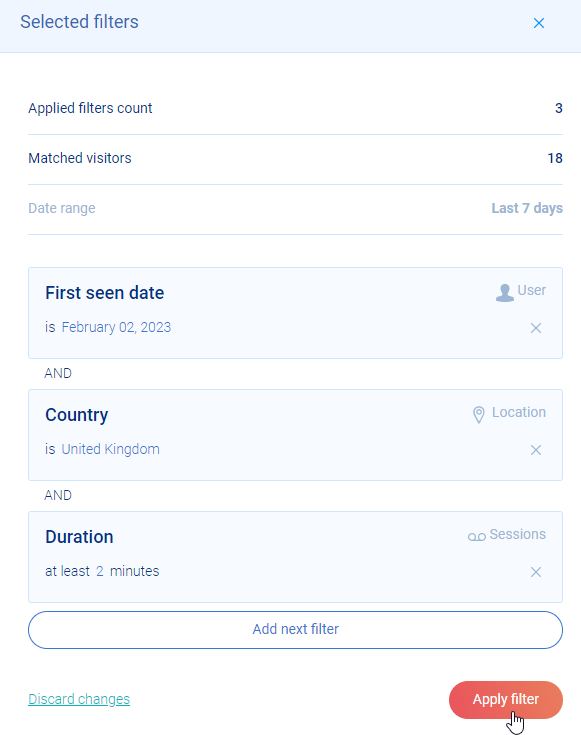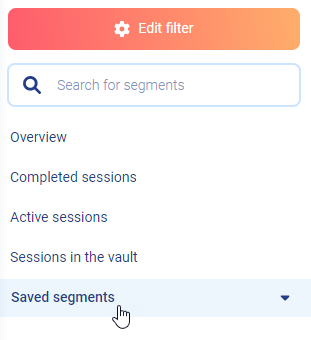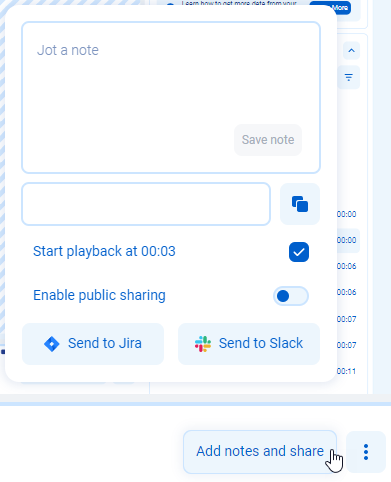Sessions
Sessions are the main data source for your Smartlook projects. Sessions are recordings and data of users on your website. Sessions begin when the user opens and interacts with your website.
Filtering sessions
You can use filters to view only the sessions that match your filters. You can base your filters on sessions, notes, location, technology, user, source (including UTM tags), and events.
Setting up filters
To filter sessions:
- Go to the Sessions page.
- Click + New filter.
- Choose the filter you want.
- Set up the filter and click Apply.
- (Optional) You can add another filter by clicking Add next filter.
- Once your filter is ready, click Apply filter.

Wildcard for URL filtersYou can also use the wildcard
*character any URL filters.For example, when searching for a Visited URL:
https://shop.com/product/*/detail/*
Filter options
Once you have applied your filter, you can view the sessions that match the filter. You can also manage the filter.

To edit the filter, click a filter definition or Edit filter.
You can also save your filter for later use without needing to build the filter again.
To save your filter, click Save as segment.
Segments
Segments are your saved filters. You can view them by clicking Saved segments in on the Session page. Choose a segment from your list to view matching sessions, or manage the segment.

Filtering sessions using query parameters
You can filter sessions using URL query parameters. Available query parameters:
Query parameter | Description | Possible values | Notes |
|---|---|---|---|
| Filter by email | Any user email address | Multiple values must be separated by a comma (,) |
| Filter by user ID | Any user ID | Multiple values must be separated by a comma (,) |
| Filter by custom event | Any custom event | Values must use encodeURIcomponent method Multiple values must be separated by a comma (,) |
| Filter by clicked element event | Any element name | Values must use encodeURIcomponent method Multiple values must be separated by a comma (,) |
| Filter by rage clicks |
| Filtering by |
| Filter by date |
| Values must use encodeURIcomponent method and in ISO 8601 format When using When using |
| Filter by errors |
|
|
Using multiple filtersTo use multiple filters in a query, separate each filter with an ampersand (&).
Example URL query filters
// Email filter example
https://app.smartlook.com/org/xxx/project/xxx/[email protected]&filterDateRange=last90Days
// Custom event fiter example
https://app.smartlook.com/org/xxx/project/xxx/recordings?filterCustomEvent=dashboard_login,notification_displayed
// Clicked element filter
https://app.smartlook.com/org/xxx/project/xxx/recordings?filterClickedElement=LI%23app-menu-funnels,DIV%20%3E%20DIV
// Rage click filter
https://app.smartlook.com/org/xxx/project/xxx/recordings?filterRageClicks=true
// Date range filter
https://app.smartlook.com/org/xxx/project/xxx/recordings?filterDateRange=in_range,2023-04-09T00%3A00%3A00%2B02%3A00,2023-04-20T00%3A00%3A00%2B02%3A00Sharing sessions
You can enable sharing for your sessions in the Smartlook player.
To share a session, click Add notes and share and then Generate share link.

You can now share the session by copying the share link, or sharing to Jira or Slack. If you want people who are not a part of your organization to view the session, you can Enable public sharing.
Adding notes
You can leave notes in your sessions to give viewers more context, point something out, or if you found something in the session particularly interesting.
To create notes, click Sharing and notes and enter your note. Then, click Save note.
You can search for notes by using a Note filter.
Updated 5 months ago
